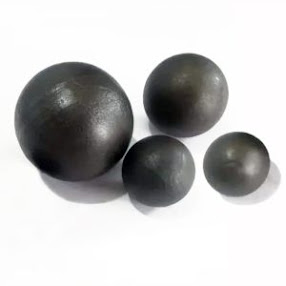Grinding Steel Ball vs. Forged Steel Ball: Unveiling the Key Differences
When it comes to the world of industrial grinding and
milling, the choice of grinding media can significantly impact the efficiency
and effectiveness of the process. Two common options are Grinding Steel Balls
and Forged Steel Balls. In this blog, we will explore the key differences
between these two types of steel balls and how each plays a vital role in
various applications.
The Grinding
Steel Ball is a widely used grinding medium in industries such as
mining, cement, and power generation. Here are some key characteristics:
Manufacturing Process:
Grinding Steel Balls are produced through a casting process. This involves
pouring molten steel into molds to form the spherical shape.
Surface Hardness:
They typically have lower surface hardness compared to Forged Steel Balls,
which can affect their wear resistance.
Cost-Efficiency:
Grinding Steel Balls are often a more cost-effective option due to the casting
process's lower production costs.
Versatility: They
are suitable for various applications, including dry and wet grinding.
Forged
Steel Ball: The Precision Choice for Grinding
On the other hand, Forged Steel Balls are known for their
precision and durability, making them a preferred choice for specific
applications. Here's what sets them apart:
Manufacturing Process:
Forged Steel Balls are created through a forging process, where the steel is
heated and shaped using mechanical hammers.
Surface Hardness:
They exhibit higher surface hardness, resulting in improved wear resistance,
which is crucial for high-impact grinding.
Quality Assurance:
The forging process allows for better control over the microstructure, ensuring
uniform hardness and quality.
Specialized
Applications: Forged Steel Balls are often chosen for applications
involving high-impact and abrasive grinding, such as in ball mills.
Choosing the Right
Steel Ball for Your Application
The choice between Grinding Steel Balls and Forged Steel
Balls should depend on your specific grinding needs:
If you require cost-efficiency and versatility for less
abrasive grinding processes, Grinding Steel Balls may be a suitable choice.
For high-impact grinding applications demanding durability
and superior wear resistance, Forged Steel Balls are the optimal selection.
Grinding Ball
Experts: Your Trusted Source
Whether you opt for Grinding Steel Balls or Forged Steel
Balls, it's crucial to source them from reputable suppliers like Grinding Ball
Experts. Here's why they are a trusted choice:
Product Variety:
They offer a wide range of grinding balls tailored to meet various industry
needs.
Quality Assurance:
With a commitment to quality, their products undergo stringent quality control
measures to ensure consistent performance.
Expertise:
Grinding Ball Experts have extensive knowledge in grinding media, allowing them
to assist you in selecting the right steel balls for your application.
Competitive Pricing:
They provide competitive pricing options to maximize the value of your
investment.
Conclusion
In the world of industrial grinding, the choice between Grinding
Steel Balls and Forged Steel Balls can significantly impact your
operations. Each type has its unique characteristics and applications.
Understanding these differences is key to selecting the right grinding media
for your specific needs. Whether you seek cost-efficiency or durability,
choosing a trusted supplier like Grinding Ball Experts ensures that your
grinding process operates at its best, delivering optimal results.


Comments
Post a Comment